人教版(2019)必修 第三册Unit 2 Morals and Virtues Reading for Writing课件(共30张PPT)
文档属性
| 名称 | 人教版(2019)必修 第三册Unit 2 Morals and Virtues Reading for Writing课件(共30张PPT) | 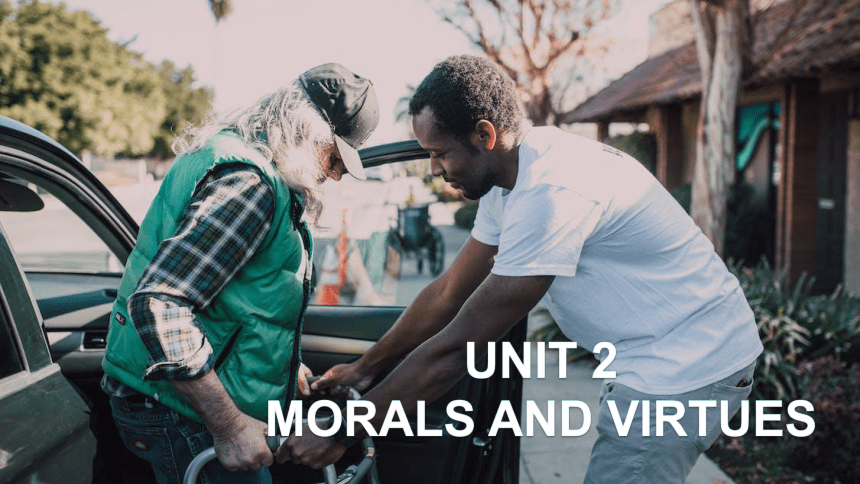 | |
| 格式 | pptx | ||
| 文件大小 | 4.5MB | ||
| 资源类型 | 教案 | ||
| 版本资源 | 人教版(2019) | ||
| 科目 | 英语 | ||
| 更新时间 | 2024-03-04 09:36:48 | ||
图片预览

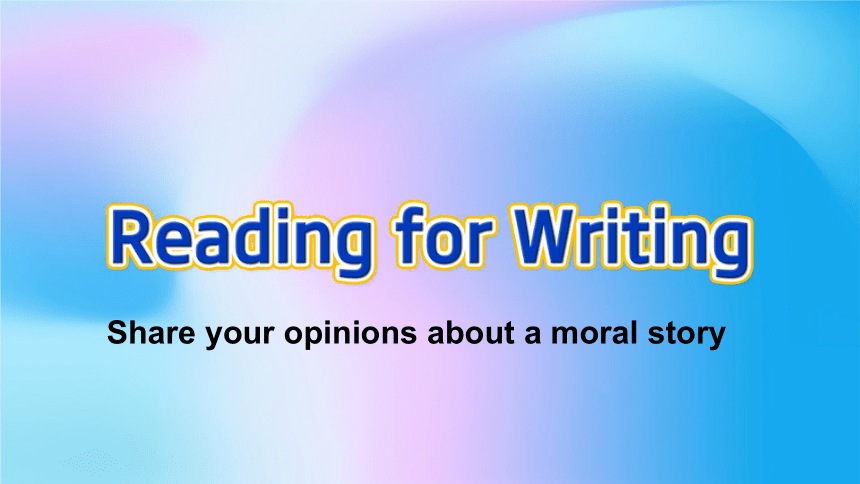
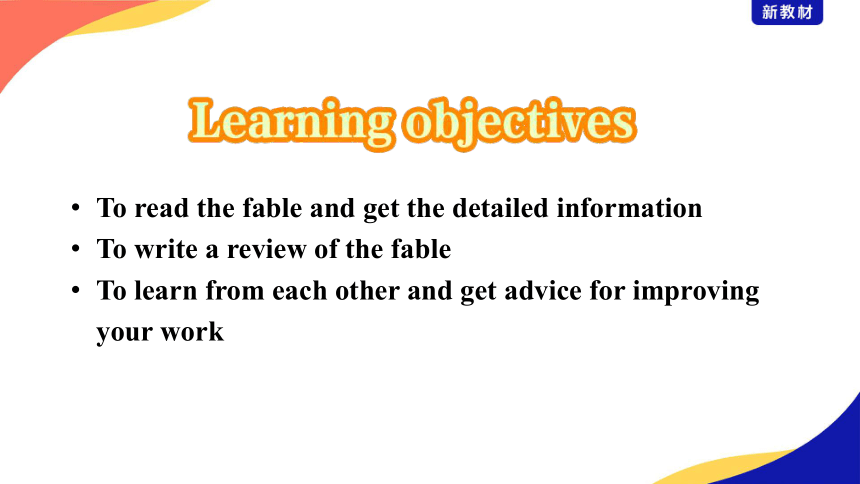
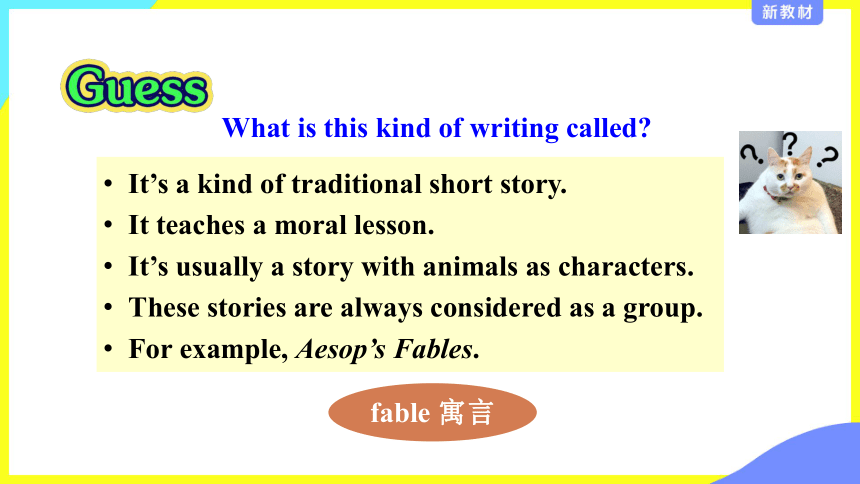
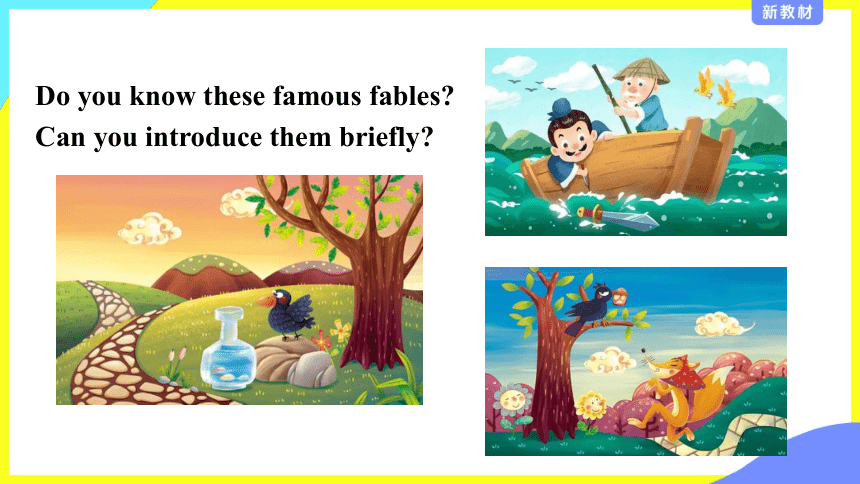
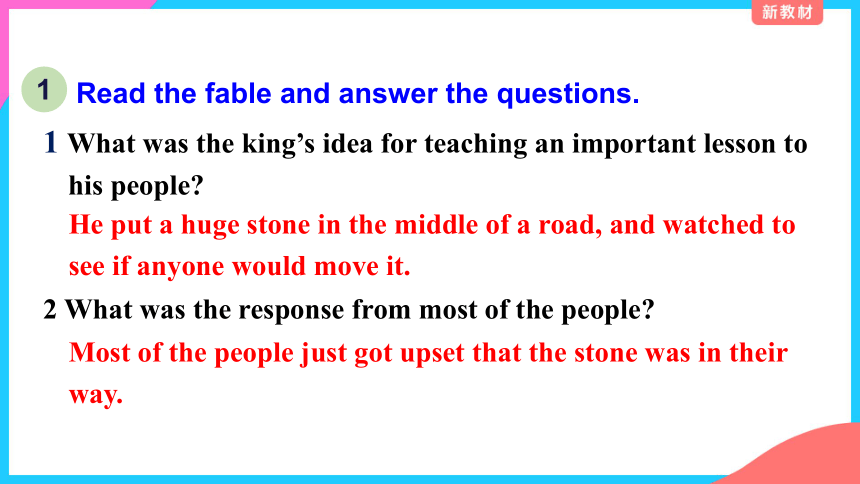
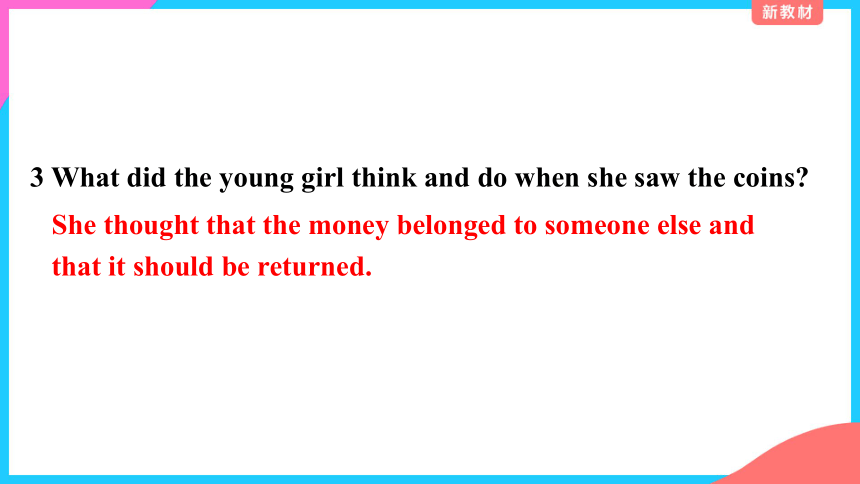
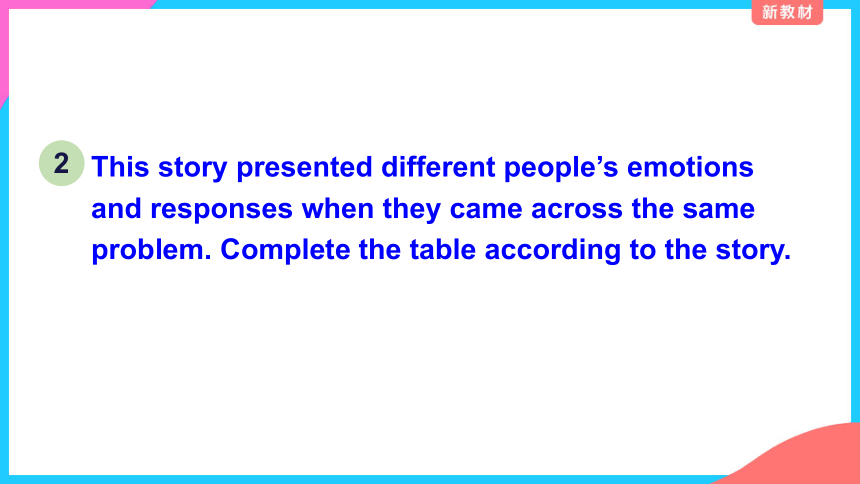
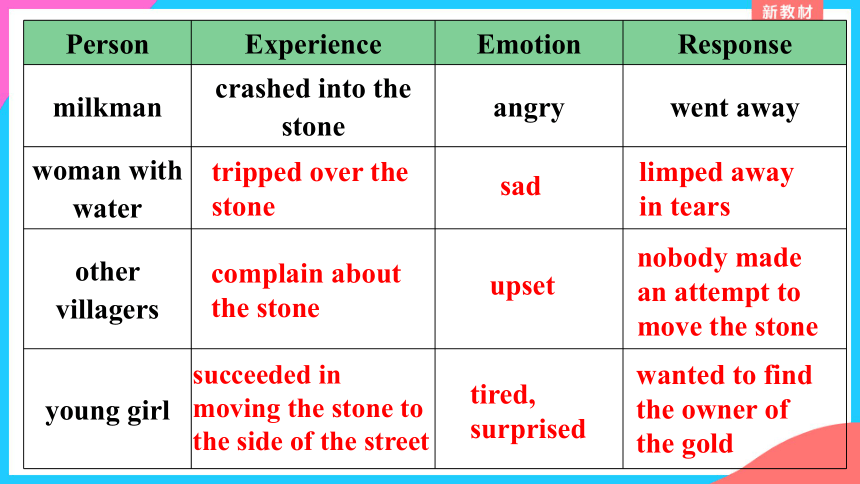
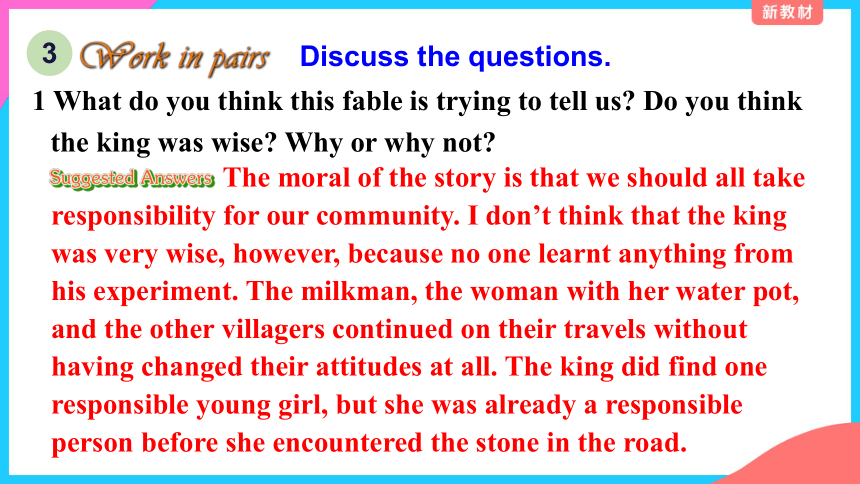

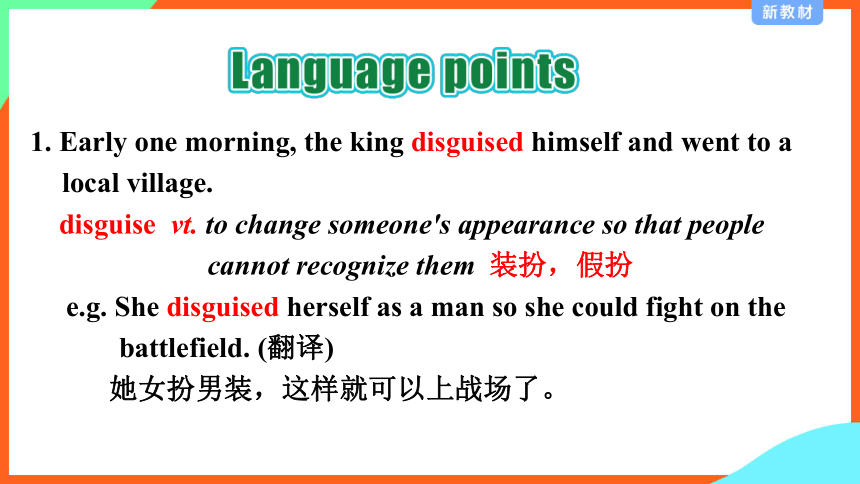
文档简介
(共30张PPT)
UNIT 2
MORALS AND VIRTUES
Share your opinions about a moral story
To read the fable and get the detailed information
To write a review of the fable
To learn from each other and get advice for improving your work
It’s a kind of traditional short story.
It teaches a moral lesson.
It’s usually a story with animals as characters.
These stories are always considered as a group.
For example, Aesop’s Fables.
What is this kind of writing called
fable 寓言
Do you know these famous fables
Can you introduce them briefly
Read the fable and answer the questions.
1 What was the king’s idea for teaching an important lesson to his people
2 What was the response from most of the people
He put a huge stone in the middle of a road, and watched to see if anyone would move it.
Most of the people just got upset that the stone was in their way.
1
3 What did the young girl think and do when she saw the coins
She thought that the money belonged to someone else and that it should be returned.
This story presented different people’s emotions and responses when they came across the same plete the table according to the story.
2
Person Experience Emotion Response
milkman crashed into the stone angry went away
woman with water
other villagers
young girl
tripped over the stone
limped away in tears
sad
upset
wanted to find the owner of the gold
tired, surprised
succeeded in
moving the stone to the side of the street
nobody made an attempt to move the stone
complain about the stone
Discuss the questions.
1 What do you think this fable is trying to tell us Do you think the king was wise Why or why not
The moral of the story is that we should all take responsibility for our community. I don’t think that the king was very wise, however, because no one learnt anything from his experiment. The milkman, the woman with her water pot, and the other villagers continued on their travels without having changed their attitudes at all. The king did find one responsible young girl, but she was already a responsible person before she encountered the stone in the road.
3
2 Can you think of times in your own life when you felt and acted like the girl or like the other people in the story Give examples.
There have been times when I have acted responsibly like the girl in the story. For example, I recently saw some children playing on a dangerous balcony, and so I warned them it was dangerous and had them go somewhere else to play. However, often I'm more like the milkman in the story because I'm very busy with my own work and worries.
1. Early one morning, the king disguised himself and went to a local village.
disguise vt. to change someone's appearance so that people cannot recognize them 装扮,假扮
e.g. She disguised herself as a man so she could fight on the battlefield. (翻译)
她女扮男装,这样就可以上战场了。
disguise n. something that you wear or use to change your appearance so that people do not recognize you
伪装;化妆用具
e.g. His disguise didn’t fool anyone. (翻译)
他的伪装没能骗过任何人。
2. He crashed into the stone, spilling the milk everywhere.
spill vt. & vi. if you spill a liquid, or if it spills, it accidentally flows over the edge of a container (spilt/spilled, spilt/spilled)(使)溢出;(使)泼洒
e.g. Katie almost spilled her milk.
Katie差点儿把牛奶弄洒。
spill sth. down / on / over sth.
e.g. Oh no! I've spilt coffee all down my shirt!
糟糕,我把咖啡洒得满衬衫都是!
3. One woman tripped over the stone and her water pot went crashing to the ground.
trip over: to hit something with your foot by accident so that you fall or almost fall 被……绊倒
e.g. She tripped (over the cat) and fell.
她(让猫)绊了一跤,摔倒了。
4. She picked herself up and limped away in tears.
limp vi. to walk slowly and with difficulty because one leg is hurt or injured 跛行,一瘸一拐地走
e.g. Moreno limped off the field with a foot injury.
Moreno脚受了伤,一瘸一拐地走下了球场。
tear n. a drop of salty liquid that comes out of your eye when you are crying 眼泪,泪水
in tears 流着泪;含着泪
e.g. The children were all in tears.
孩子们全都哭了。
5. “Is there no one in this village who feels any responsibility to keep their neighbours from harm ”
harm n. damage, injury, or trouble caused by someone’s actions or by an event 伤害;损害
常用搭配:
do sb. harm 对某人有害
do harm to ... 对……有害
mean no harm 没有恶意
e.g. Smoking will do harm to your health.
吸烟对你的健康有害。
harm vt. harm somebody/something to hurt or injure somebody or to damage something 伤害;损害
e.g. It will harm no one at all.
它不会伤害到任何人。
【语境应用】根据括号内的汉语提示补全下面句子(每空一词,含缩略词)。
1) It wouldn’t ________ ________ ________ ________ (对他有任何害处) to work harder.
2) Come in please. Our dog ________ ________ ________ (不会伤害你).
do him any harm
won’t harm you
6. The king was in despair.
despair n. a feeling that you have no hope at all 绝望
in despair 处于绝望中
e.g. A person is most disappointed when he is in despair.
一个人在绝望时最失望。
despair vi. to feel that there is no hope at all 绝望,感到无望
despair of doing sth. / despair of sb.
e.g. *Despite his illness, Ron never despaired.
*The teachers began to despair of him.
*They’d almost despaired of finding the child.
7. The girl pushed the stone with all her might.
with all one’s might: with all the strength and power
全力以赴地,竭尽全力地
e.g. *He fought back with all his might.
他倾尽全力反击。
*He tried to throw again with all his might.
他用尽全力再一次投掷。
8. After a great deal of effort, she finally succeeded in moving it to the side of the street.
a great deal (of) : a good deal, a large quantity of something
大量的
a great deal of + n. [U] 大量的……
a great deal 大量,非常(可以单独使用,也可以修饰形容词、副词的比较级)
e.g. *It took a great deal of time and effort.
那需要花费大量时间和精力。
*She has a great deal to do today.
她今天有很多事情要做。
表示“许多”的词(组)
修饰可数名词:many, many a, a great/good many, a great / good / large number of
修饰不可数名词:much, a large amount of, amounts of
既可以修饰可数名词又可以修饰不可数名词:a lot of, lots of, a quantity of, quantities of (谓语用复数), plenty of
Write a review
The main purpose of a review is to give your opinion about a piece of writing. You should first give a short description of the writing, and then clearly state your opinion and your reasons.
Write a review of the fable. Use the outline below to help you.
Paragraph 1: Basic information about the story What is the title of the story
What kind of story is it
What is the main idea of the story
Paragraph 2: Your analysis of the story What is the author's purpose
Were the details of the story clear
Do you think the story achieved its purpose
Paragraph 3: Your opinion about the story What did you like about the story
What did you not like about the story
Would you recommend this story to others
4
一、审题定调
寓言故事评论是指通过读一段寓言故事,根据其寓意选择一个角度写作。在写作时既要有“读”的内容,又要有“感”的内容。“读”要求抓住重点,“感”要求写出体会。
二、谋篇布局
本读后感可以分为三部分:
第一部分:点明所读故事的标题或主旨;
第二部分:概述故事大意;
第三部分:阐述该故事对你的启示。
三、词汇素材
aggressive adj. 有进取心的 energetic adj. 精力充沛的
striving spirit 进取精神 open-minded adj. 思想开明的
willpower / persistence n. 毅力
withstand challenges 经得住挑战
widen one’s knowledge 拓宽某人的知识面
be happy/sad/upset/nervous/lonely…
be pleased with/ be disappointed at sb/ be confident of…
“The Stone in the Road” is an old fable about a king who thinks his people are lazy. He puts a large stone in the middle of the road and hides and waits to see if anyone will try to move it.
The author used this story to impress upon readers the need to take personal responsibility for problems in the community. The story was quite successful in achieving its purpose, and I liked it because it had a clear moral.
However, while the moral of the story is clear, the actions of the king seemed pointless to me, because none of the characters in the story learnt anything. For this reason, I think there are better stories that can be used to impress upon people the need for personal responsibility.
Exchange drafts. Use the checklist to give feedback on your partner's draft.
Does the writer give a short description of the story
Does the description include the most important details of the story
Does the writer give his/her opinion about the characters or their actions
Is the review well-organised
Does the writer use the -ing form as the adverbial in the review
Are there any grammar, spelling, or punctuation errors
5
Get your draft back and revise it.
Write a brief summary of the fable “The Stone in the Road” using no more than 60 words.
6
UNIT 2
MORALS AND VIRTUES
Share your opinions about a moral story
To read the fable and get the detailed information
To write a review of the fable
To learn from each other and get advice for improving your work
It’s a kind of traditional short story.
It teaches a moral lesson.
It’s usually a story with animals as characters.
These stories are always considered as a group.
For example, Aesop’s Fables.
What is this kind of writing called
fable 寓言
Do you know these famous fables
Can you introduce them briefly
Read the fable and answer the questions.
1 What was the king’s idea for teaching an important lesson to his people
2 What was the response from most of the people
He put a huge stone in the middle of a road, and watched to see if anyone would move it.
Most of the people just got upset that the stone was in their way.
1
3 What did the young girl think and do when she saw the coins
She thought that the money belonged to someone else and that it should be returned.
This story presented different people’s emotions and responses when they came across the same plete the table according to the story.
2
Person Experience Emotion Response
milkman crashed into the stone angry went away
woman with water
other villagers
young girl
tripped over the stone
limped away in tears
sad
upset
wanted to find the owner of the gold
tired, surprised
succeeded in
moving the stone to the side of the street
nobody made an attempt to move the stone
complain about the stone
Discuss the questions.
1 What do you think this fable is trying to tell us Do you think the king was wise Why or why not
The moral of the story is that we should all take responsibility for our community. I don’t think that the king was very wise, however, because no one learnt anything from his experiment. The milkman, the woman with her water pot, and the other villagers continued on their travels without having changed their attitudes at all. The king did find one responsible young girl, but she was already a responsible person before she encountered the stone in the road.
3
2 Can you think of times in your own life when you felt and acted like the girl or like the other people in the story Give examples.
There have been times when I have acted responsibly like the girl in the story. For example, I recently saw some children playing on a dangerous balcony, and so I warned them it was dangerous and had them go somewhere else to play. However, often I'm more like the milkman in the story because I'm very busy with my own work and worries.
1. Early one morning, the king disguised himself and went to a local village.
disguise vt. to change someone's appearance so that people cannot recognize them 装扮,假扮
e.g. She disguised herself as a man so she could fight on the battlefield. (翻译)
她女扮男装,这样就可以上战场了。
disguise n. something that you wear or use to change your appearance so that people do not recognize you
伪装;化妆用具
e.g. His disguise didn’t fool anyone. (翻译)
他的伪装没能骗过任何人。
2. He crashed into the stone, spilling the milk everywhere.
spill vt. & vi. if you spill a liquid, or if it spills, it accidentally flows over the edge of a container (spilt/spilled, spilt/spilled)(使)溢出;(使)泼洒
e.g. Katie almost spilled her milk.
Katie差点儿把牛奶弄洒。
spill sth. down / on / over sth.
e.g. Oh no! I've spilt coffee all down my shirt!
糟糕,我把咖啡洒得满衬衫都是!
3. One woman tripped over the stone and her water pot went crashing to the ground.
trip over: to hit something with your foot by accident so that you fall or almost fall 被……绊倒
e.g. She tripped (over the cat) and fell.
她(让猫)绊了一跤,摔倒了。
4. She picked herself up and limped away in tears.
limp vi. to walk slowly and with difficulty because one leg is hurt or injured 跛行,一瘸一拐地走
e.g. Moreno limped off the field with a foot injury.
Moreno脚受了伤,一瘸一拐地走下了球场。
tear n. a drop of salty liquid that comes out of your eye when you are crying 眼泪,泪水
in tears 流着泪;含着泪
e.g. The children were all in tears.
孩子们全都哭了。
5. “Is there no one in this village who feels any responsibility to keep their neighbours from harm ”
harm n. damage, injury, or trouble caused by someone’s actions or by an event 伤害;损害
常用搭配:
do sb. harm 对某人有害
do harm to ... 对……有害
mean no harm 没有恶意
e.g. Smoking will do harm to your health.
吸烟对你的健康有害。
harm vt. harm somebody/something to hurt or injure somebody or to damage something 伤害;损害
e.g. It will harm no one at all.
它不会伤害到任何人。
【语境应用】根据括号内的汉语提示补全下面句子(每空一词,含缩略词)。
1) It wouldn’t ________ ________ ________ ________ (对他有任何害处) to work harder.
2) Come in please. Our dog ________ ________ ________ (不会伤害你).
do him any harm
won’t harm you
6. The king was in despair.
despair n. a feeling that you have no hope at all 绝望
in despair 处于绝望中
e.g. A person is most disappointed when he is in despair.
一个人在绝望时最失望。
despair vi. to feel that there is no hope at all 绝望,感到无望
despair of doing sth. / despair of sb.
e.g. *Despite his illness, Ron never despaired.
*The teachers began to despair of him.
*They’d almost despaired of finding the child.
7. The girl pushed the stone with all her might.
with all one’s might: with all the strength and power
全力以赴地,竭尽全力地
e.g. *He fought back with all his might.
他倾尽全力反击。
*He tried to throw again with all his might.
他用尽全力再一次投掷。
8. After a great deal of effort, she finally succeeded in moving it to the side of the street.
a great deal (of) : a good deal, a large quantity of something
大量的
a great deal of + n. [U] 大量的……
a great deal 大量,非常(可以单独使用,也可以修饰形容词、副词的比较级)
e.g. *It took a great deal of time and effort.
那需要花费大量时间和精力。
*She has a great deal to do today.
她今天有很多事情要做。
表示“许多”的词(组)
修饰可数名词:many, many a, a great/good many, a great / good / large number of
修饰不可数名词:much, a large amount of, amounts of
既可以修饰可数名词又可以修饰不可数名词:a lot of, lots of, a quantity of, quantities of (谓语用复数), plenty of
Write a review
The main purpose of a review is to give your opinion about a piece of writing. You should first give a short description of the writing, and then clearly state your opinion and your reasons.
Write a review of the fable. Use the outline below to help you.
Paragraph 1: Basic information about the story What is the title of the story
What kind of story is it
What is the main idea of the story
Paragraph 2: Your analysis of the story What is the author's purpose
Were the details of the story clear
Do you think the story achieved its purpose
Paragraph 3: Your opinion about the story What did you like about the story
What did you not like about the story
Would you recommend this story to others
4
一、审题定调
寓言故事评论是指通过读一段寓言故事,根据其寓意选择一个角度写作。在写作时既要有“读”的内容,又要有“感”的内容。“读”要求抓住重点,“感”要求写出体会。
二、谋篇布局
本读后感可以分为三部分:
第一部分:点明所读故事的标题或主旨;
第二部分:概述故事大意;
第三部分:阐述该故事对你的启示。
三、词汇素材
aggressive adj. 有进取心的 energetic adj. 精力充沛的
striving spirit 进取精神 open-minded adj. 思想开明的
willpower / persistence n. 毅力
withstand challenges 经得住挑战
widen one’s knowledge 拓宽某人的知识面
be happy/sad/upset/nervous/lonely…
be pleased with/ be disappointed at sb/ be confident of…
“The Stone in the Road” is an old fable about a king who thinks his people are lazy. He puts a large stone in the middle of the road and hides and waits to see if anyone will try to move it.
The author used this story to impress upon readers the need to take personal responsibility for problems in the community. The story was quite successful in achieving its purpose, and I liked it because it had a clear moral.
However, while the moral of the story is clear, the actions of the king seemed pointless to me, because none of the characters in the story learnt anything. For this reason, I think there are better stories that can be used to impress upon people the need for personal responsibility.
Exchange drafts. Use the checklist to give feedback on your partner's draft.
Does the writer give a short description of the story
Does the description include the most important details of the story
Does the writer give his/her opinion about the characters or their actions
Is the review well-organised
Does the writer use the -ing form as the adverbial in the review
Are there any grammar, spelling, or punctuation errors
5
Get your draft back and revise it.
Write a brief summary of the fable “The Stone in the Road” using no more than 60 words.
6
